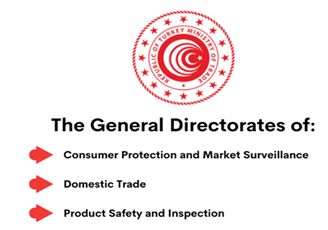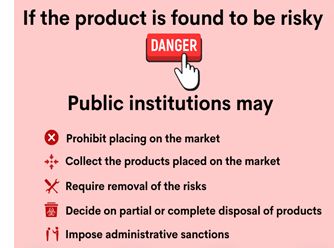Every product to be put on the market must comply with all technical regulations regarding human, animal and plant health, life and property safety, the environment and consumer protection. In other words, every product must be safe.
A safe product refers to a product that does not pose a risk to consumers under normal conditions of use or that has an acceptable risk and provides maximum protection in terms of the fundamental requirements mentioned above.
It is the responsibility of the
- manufacturer,
- authorized representative
- and/or importer
that the products placed on the market are safe. The inspection and supervision of whether the manufacturers, authorized representatives and importers fulfill these responsibilities is carried out by public institutions
- at the stage of import,
- at the market supply stage or
- while the products are in the market.
In this context, public institutions are authorized to prepare and enforce the technical legislation on products, to inspect whether the product is manufactured, placed or distributed on the market in accordance with the relevant technical regulation.
Public institutions carry out market surveillance and inspection by checking labels, signs, packaging and documents and, when necessary, by applying for tests.
Market surveillance activities mainly consist of the following stages:
- The relevant public institution makes a strategic plan in which the companies, product groups and risk factors to be inspected are prioritized.
- Within the framework of this plan, public institutions perform marking and document control, and take samples for technical or medical tests when necessary.
- The samples taken are subject to laboratory analysis.
- If the products are found to be unsafe as a result of inspections, public institutions are authorized to (i) prohibit the placing on the market, (ii) collect the unsafe products placed on the market, (iii) require the manufacturer or importer to remove the risky aspects, (iv) partially or completely dispose of the products according to the risks they bear, in cases where the product is not secured by the manufacturer or it is impossible to secure the product and (v) impose administrative sanctions.
- Lastly, the measures are announced to the public to protect the health of consumers.

In this article, we will focus on the three musketeers of the Ministry of Trade that carry out product safety and market surveillance activities in Turkey for the purpose of consumer protection.
1. The General Directorate of Consumer Protection and Market Surveillance
The General Directorate of Consumer Protection and Market Surveillance (CPMS) is within the organization of the Ministry of Trade. The Regulation of the Ministry of Trade on Market Surveillance and Inspection dated 2020 set out the duties of the CPMS.
In accordance with the Regulation, the CPMS ensures the coordination of the inspections that the Ministry is responsible for and the effective realization of these inspections by taking the necessary measures. In this context, it is among the duties of the General Directorate to prepare, implement and periodically update sectoral inspection programs that include data on products, risk assessments and companies that will be subject to inspection on a provincial or regional basis. To do so, CPMS makes a risk assessment regarding the products that will be the basis for the inspections. The Risk Assessment Board, operating under the CPMS, determines the risk of unsafe products, considering factors such as the description of the product, its nature, the danger it may cause, the consumers targeted by the product, the severity and the possibility of injury.

The CPMS conducts inspections through its authorized inspectors according to the annual inspection programs determined as a result of this risk analysis. In addition to these programs, the CPMS may carry out reactive inspections, which are triggered by complaints, accidents, reports from the media or notifications under the Rapid Exchange of Information System ("RAPEX") etc.
Inspectors may carry out inspections at every place where products are supplied to the market, distributed and sold for a price or for free; including warehouses, workplaces, transport vehicles and production facilities, where they are processed, packaged, assembled or filled.
Market surveillance and inspection activities are carried out by one or more of the methods of:
- Examination through the signs and / or documents stipulated by the technical regulation;
- Inspection;
- Medical or technical test.
Therefore, inspectors are authorized to take samples from inspected products for testing, if deemed necessary. The CPMS covers the test, inspection and transportation costs.
For products found to be unsafe as a result of the test, the following sanctions can be imposed in accordance with the decisions of the Risk Assessment Commission and the principle of proportionality:
- Prohibition of the supply of the product on the market;
- Withdrawal of products placed on the market;
- Whole or partial disposal of the products in cases where the products cannot be rendered safe.
- Administrative sanctions
In the event that the producers do not fulfill their legal obligations such as announcement, collection and disposal of products that are found to be unsafe as a result of the inspections, these obligations are fulfilled by the CPMS. In addition, the CPMS is also responsible for publishing information on unsafe products in appropriate channels in order to announce it to consumers at risk.
2. The General Directorate of Product Safety and Inspection
The General Directorate of Product Safety and Inspection ("GDPSI") carries out its duties and services for domestic trade within the Ministry of Trade in accordance with Presidential Decree No.1. Accordingly, the duties of GDPSI are as follows:
- Preparation of product safety policies;
- Work on the prevention of technical barriers to trade;
- To prepare and implement the decision of the Technical Regulations Regime;
- Increasing the quality, competitiveness and reputation of export products in foreign markets;
- To prepare technical regulations for products engaged in foreign trade;
- Auditing compliance with technical regulations;
- Coordinating compliance with the technical legislation of the European Union and harmonizing regulations on product safety, technical regulations, technical barriers and conformity assessments;
- Monitoring the market;
- To coordinate bilateral, regional and multilateral international studies on technical regulations, standardization and quality;
- To observe the compliance of national technical regulations and inspections with international obligations.
The main duties of GDPSI can be categorized under four main categories such as:
- Rules and procedures on technical regulations and standards;
- Market surveillance;
- Product safety and quality control system on imports and exports;
- Technical barriers.
2.1. Rules and procedures on technical regulations and standards
The GDPSI ensures the coordination of work among competent authorities in Turkey operating in the field of product safety. In addition, it coordinates the compliance of Turkish technical legislation with the EU's, in particular those in the field of product safety.
To transpose the rules relating to general product safety, CE marking, notified bodies and market surveillance, "the Law on the Preparation and Implementation of Technical Legislation on Products (Law No. 4703)" was enacted in January 20021 and the following Regulations were put into force:
- Regulation on CE Marking;
- Regulation on Conformity Assessment Bodies and Notified Bodies;
- Regulation on Market Surveillance of the Goods;
- Regulation on the Exchange of Information on Technical Legislation on Goods and Standards between Turkey and the European Union;
- Regulation on Mutual Recognition in the Non-Harmonized Area.
The GDPSI published three draft regulations regarding to implementation of the Product Safety Act:
- Draft regulation General Product Safety Regulation;
- Draft Regulation on Compliance of Products and Market Surveillance and Inspection;
- Draft Regulation on Market Surveillance and Inspection of Products Placed on the Market via Remote Communication Tools;
As per the Custom Union Agreement with the EU, Turkey has aligned itself with the technical legislation of the EU and promotes cooperation between the two parties in the areas of standardization, accreditation, metrology and conformity assessment. GDPSI is one of the leading administrative agencies in this framework.
2.2. Market surveillance
Under law no 4703, "market surveillance" is defined as a public authority activity and market surveillance authorities are empowered to conduct these activities and impose measures to ensure the removal of unsafe products from the market. Accordingly, in Turkey market surveillance is under the responsibility of public authorities that are legally authorized to prepare and implement legislation regarding products. For example, the Ministry of Health is responsible for the surveillance of cosmetics and medical devices, the Ministry of Environment and Urbanizations is responsible for the surveillance of construction products and solid fuels, and the Ministry of Family, Labor and Social Services is responsible for the surveillance of personal protective equipment. GDPSI is responsible for the coordination of different market surveillance authorities and compliance with European Union legislation.
2.3. Product safety and quality control system for imports and exports
The "Risk-Based Trade Control System (TAREKS)" was launched at the end of 2010 by the Ministry of Trade to carry out safety and quality checks on the international trade of goods through a database on risk basis. TAREKS aims to provide safe and quality products for consumers and firms, rationalize the resource allocation vis-à-vis the control of "risky" products and traders, and reduce waiting periods at the customs. In this context, GDPSI publishes the following communiqués every year:
- Communiqué on Inspection of Conformity with Standards in Imports (Product Safety and Inspection: 2021/1);
- Import Inspection Communiqué on Controlled Waste in Terms of Environmental Protection (Product Safety and Inspection: 2021/3);
- Import Inspection Communiqué on Substances Subject to Special Permission of the Ministry of Health (Product Safety and Inspection: 2021/4);
- Notification on Import Inspection of Products Subject to the Control of the Ministry of Agriculture and Forestry (Product Safety and Inspection: 2021/5);
- Import Inspection Communiqué on Controlled Chemicals in Terms of Environmental Protection (Product Safety and Inspection: 2021/6);
- Imports Inspection Communiqué on Solid Fuels Under Controls for Environmental Protection (Product Safety and Inspection: 2021/7);
- Import Inspection Communiqué on Radio Equipment (Product Safety and Inspection: 2021/8);
- Import Inspection Communiqué on Some Products Required to Carry "CE" Mark (Product Safety and Inspection: 2021/9);
- Import Inspection Communiqué on Toys (Product Safety and Inspection: 2021/10)
- Import Inspection Communiqué on Personal Protective Equipment (Product Safety and Inspection: 2021/11);
- Import Inspection Communiqué on Consumer Products (Product Safety of, and Inspection: 2021/12) –– Import Control Communiqué on Building Materials (Product Safety and Inspection: 2021/14);
- Import Inspection Notification of Batteries and Accumulators (Product Safety and Inspection: 2021/15);
- Import Inspection Communiqué on Medical Devices (Product Safety and Inspection: 2021/16);
- Communiqué on Product Safety and Inspection No. 2021/18 and Communiqué on Product Safety and Inspection No. 2021/26 regulate the import controls of textile, leather and clothing products;
- Communiqué on Import Inspection of Tobacco, Tobacco Products, Alcohol and Alcoholic Beverages (Product Safety and Inspection: 2019/19);
- Import Inspection Notification on Some Products Inspected by the Ministry of Health (Product Safety and Inspection: 2021/20);
- The Communiqué on Commercial Quality Inspection in the Export and Import of Some Agricultural Products (Product Safety and Inspection: 2021/21);
- Communiqué on Classification of Firms for Risk-Based Commercial Quality Inspections in Exports (Product Safety and Inspection: 2021/22);
- Import Inspection Communiqué on Metal Scraps Under Control in Terms of Environmental Protection (Product Safety and Inspection: 2021/23);
- Import Inspection Communiqué on Vehicle Parts (Product Safety and Inspection: 2021/25);
- Communiqué on Standardization of Cotton (Product Safety and Inspection: 2012/27);
- Communiqué on the Announcement of the New Values of Administrative Fines Regulated by the Law on the Preparation and Implementation of Technical Legislation Regarding Products No 4703 (Product Safety and Inspection: 2021/13).
2.4. Technical barriers
Standards, technical regulations and conformity assessment procedures often lead to barriers that adversely affect the free flow of international trade, which are referred to as technical barriers to trade. For example, creating technical criteria different from internationally accepted standards and requiring strict testing and certification processes are the most common problems. Technical barriers cause additional burden and costs for export companies and impair their competitiveness. The Agreement on Technical Barriers to Trade ("Agreement") ensures that technical regulations, standards, testing and certification procedures do not create unnecessary obstacles (technical barriers) to trade during their preparation, adoption, and application. The Agreement is binding for all the members of the World Trade Organization ("WTO").
In addition, transparency is one of the basic principles to prevent the negative effects of technical regulations and conformity assessment procedures on international trade. Within the scope of the Agreement, "Notification System" and "Information and Notification Centers" were established to implement the principle of transparency. In accordance with the notification system, the regulations of the WTO member countries that may pose technical obstacles are notified to other countries at the draft stage and in Turkey, GDPSI is the main body for the implementation and the administration of the Agreement and all the relevant regulations.
3. The Directorate General for Domestic Trade
The general mission of the General Directorate of Domestic Trade ("DT") is to develop commercial life in a way that contributes to the life quality of citizens and the welfare of the country, and to determine the relevant policies and regulations. The DT is also authorized to allow organizations such as exhibitions, promotional days and domestic fairs and to make arrangements for these organizations.
One of the important veins of the domestic economy is the retail sector. This gives a special importance to the regulation of retail businesses' activities. As one of DT's main duties, it works towards the healthy growth and development of the retail sector and takes the necessary measures for this purpose. A retail information system (PERBIS) – a database for retail businesses - was established in 2015 to make the necessary applications and other transactions during the opening, operation and closing of retail businesses. It is a central and cost-efficient system that saves retail businesses from complicated bureaucratic proceedings. The operation of PERBIS is under the responsibility of the DT.
Another duty of the DT is to regulate the trade of vegetables and fruits and other goods with sufficient supply and demand depth, and to provide a modern structure and effective operation of wholesale food markets and marketplaces. In this context, the DT has been authorized to make regulations regarding wholesale food markets, to determine the rules of vegetable and fruit trade, and to operate the marketplace registration system ("hal kayıt sistemi").
The DT also works on the development and dissemination of licensed warehousing and commodity exchanges. In this context, licensed warehouse operations and activities are recorded in an electronic system. The DT ensures the security of these records, monitors and inspects the activities of licensed warehouse enterprises through this system.
Another activity carried out by the DT regarding the electronic trade environment is to regulate and develop e-commerce. In this regard, the DT keeps the records and takes the necessary measures in order to fulfill the obligations stipulated by the legislation for the enterprises that carry out e-commerce activities.
4. Product safety and consumer protection in EU and Turkey
Product safety and consumer protection are among the prominent issues in Turkey's implementation of European legislation. In this context Turkey tends to follow the same pattern as EU legislation. The product safety infrastructure is very much integrated with the EU's thanks to the technical regulations introduced in Turkey over the last two decades. Various Turkish laws and regulations implement the EU directives regarding product safety, liability and consumer protection. In this regard most of the EU technical regulations in Turkey automatically become a part of Turkish legislation. In the upcoming periods, it will be possible to observe that this parallelism will increase gradually.
Footnote
1. However, on March 13, 2020, the Act No. 7223 on Product Safety and Technical Regulations ("Product Safety Act") passed into law. The Product Safety Act will come into force on March 13, 2021, and it will abolish the provisions of Law No. 4703.
The content of this article is intended to provide a general guide to the subject matter. Specialist advice should be sought about your specific circumstances.

